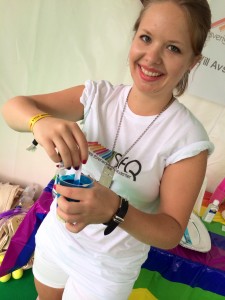Does a normal day for an LGBT-student correspond with what it says in Lund University’s plan for equal treatment? This is what the Union of LGBT-students in Sweden, SFQ, sets out to investigate. Student life in Lund can be improved, Projekt 6 states.

Photo: Private
Even in 2014, the treatment LGBT-people at Swedish universities receive still leaves a lot to be desired. This is what the Union of LGBT-students in Sweden, SFQ, the driving force behind the project “Avslöja heteronormen,” reckons.
“We are checking in what way the hetero-norm affects education at more than 20 sites of higher education and universities. The goal is to find out to what degree the content of the official plans of equal treatment corresponds with reality,” Amanda Storm Wikström, a board-member of the LGBT-Union and the one responsible for the material collected from Lund University, says.
Up until next year, students and staff have the opportunity to share their stories through the project’s website. All material is treated confidentially.
“It is also possible to send an e-mail, or to make an appointment for a private interview. We are very grateful for all the material we get,” Amanda Storm Wikström says.
Wants to help the universities
The project is a national continuation of the more local investigation conducted at the University of Gothenburg between 2011 and 2013. In the ensuing report, it was clear that a normal day for an LGBT-student seldom corresponded with the official guidelines. People not wanting to be referred to with certain gender-related pronouns were particularly vulnerable.
“We received many stories from students who had been in touch with professors in advance, telling the professor with which pronoun the person in question wished to be referred to – in response to which, the professors did not care at all,“ Amanda Storm Wikström says.
SFQ reckons that the problem does not stem from a few individuals, but instead from the structures as such. In some plans for equal treatment that have been studied, material has been found that may be interpreted as discriminating in itself. Amanda Storm Wikström is hoping that the universities will take in and listen to the contents of the report that will be released before the end of this year.
“We are not primarily looking for faults; the goal is to help the seats of learning to break free from the heteronormative thinking, and to provide suggestions on how they can improve in making their treatment of all students equal,” s/he says.
A change is needed
Eleonora Johansson is responsible for the LBGT-part of Projekt 6 in Lund. She thinks student life in general is very homogenous and heteronormative, which leads to many LBGT-people feeling unwanted and lonely. If you are not hetero and white, you may feel as if you do not belong, she thinks.
“That makes a lot of LGBT-people avoid student life instead,” Eleonora Johansson says.
Eleonora Johansson says that more organisations, as well as a change in the mind-set of the organisers of the student life in Lund, are needed to make student life in Lund more open and to decrease prejudice.
“Every student organisation should have policy work and values that accept LGBT-people. They cannot influence everyone who attends – but they can influence what picture the organisation sends out, for example, through excluding discriminating chants at a ‘sittning’,” Eleonora Johansson says.
Facts: Avslöja heteronormen!
- A national project that aims to shed light upon how hetero- and cis-norms influence the content of education, as well as the study- and work environment at Swedish places of higher education and at universities.
- Is run by the Union of LGBT-students in Sweden (SFQ) with contributions from the Swedish Agency for Youth and Civil Society, (Myndigheten för Ungdoms- och Civilsamhällsfrågor, MUCF), from 1 June until 31 December, 2014.
- The results of the investigation will be presented in a book that will be sent to the committees of equal treatment, the Equality Ombudsman (DO), and the government, among others. Apart from the results of the investigation, the book will also contain suggestions on how organisations can improve their treatment of LGBT-people.
- SFQ is now in full swing touring the country and giving lectures about the project. The schedule of their tour can be found on the Union’s Facebook-page.
Text: Tove Nordén/Axel Vikström
Translation: Richard Helander






